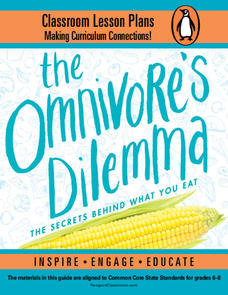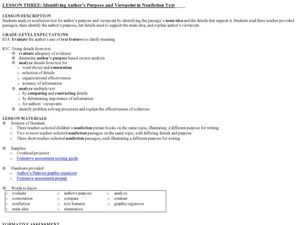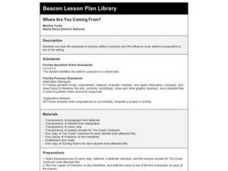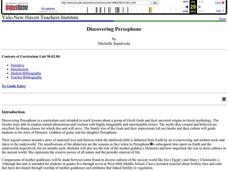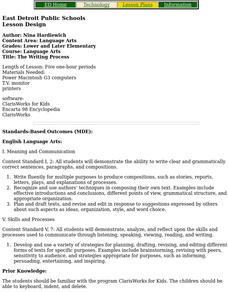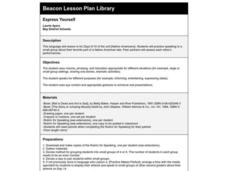Penguin Books
The Omnivore’s Dilemma, Young Readers Edition
As the saying goes, you are what you eat. A useful set of lesson plans encourage young readers to take a second look at their eating habits. Pre- and post-reading questions bring in reflective writing and discussion while extension...
Curated OER
Bottled Water Ban
Convenience, taste, portability ... what's not to love about bottled water? Apparently, a lot. Scholars analyze the four main arguments supporting and opposing the sale of bottled water. They explore the health, environmental, and...
Seterra
Northern Europe: Countries - Map Quiz Game
Remembering geography is a tiring and tedious task to many scholars. Change it up by assigning the map quiz game. Elementary and middle schoolers alike test their knowledge and compete with the clock to match as many countries as...
DirectTV
Staying Safe on The Internet
Watson the Walrus takes scholars through an interactive workbook all about internet safety. Safety tips, a maze, crossword puzzle, quiz, and coloring page make up six pages that encourage smart choices while surfing the web.
NOAA
Communicate!: Create a Unique Message About Climate Change
Scholars use their communication skills to express their take on climate change in the ninth installment of the 10-part Discover Your Changing World series. They create ways to deliver their messages on a specific aspect of climate by...
Penguin Books
The Jungle
It's a jungle out there! Teachers gain information to guide learners through reading The Jungle by Upton Sinclair. Instructors give an overview of the characters in the story and a summary of each chapter. The resource includes questions...
Curated OER
Identifying Author’s Purpose and Viewpoint in Nonfiction Text
Why do people write books? Pupils discover how to identify the author's viewpoint. They read non-fiction passages their instructor selects (the plan has the class look at nonfiction children's picture books), and then identify the...
Teach-nology
Author’s Purpose
What is the author's purpose when writing a narrative story? Kids read a short narrative passage before answering three questions about author's purpose.
Curated OER
Why Do Authors Write?
Sixth graders use short reading passages to identify, explain, and discuss the author's purpose for writing. After a lecture/demo, they utilize a graphic organizer embedded in this plan to organize their writing ideas.
Curated OER
Where Are You Coming From?
Pupils examine and discuss author's purpose and the influence of an author's perspective in his or her writing. In groups, they read scenarios and respond to them from the perspective of a designated character. Materials are attached.
Curated OER
Civic Engagement for Us?
Students identify the different forms of civic engagement. They identify their responsibilities at the different levels of government. They also analyze young leaders running for office.
Curated OER
The Houdini Box: Compare and Contrast
How did Houdini do it? After reading a short passage about magicians and their tricks, readers are asked to compare and contrast some of the illusions these prestidigitators create.
Curated OER
Grammar Worksheets: Who or Whom?
Who or whom? Do your young grammarians need extra practice using interrogative pronouns correctly? The seven sentences in this exercise will provide that opportunity; however, the worksheet does not provide definitions, examples, or an...
Curated OER
The Swiss Family Robinson Teacher's Notes
Guide young readers through the classic novel The Swiss Family Robinson with this collection of activities and worksheets. From basic spelling and grammar practice, to reading comprehension skills, this resource will enhance children's...
Ballet Austin
The History of Modern Dance
The evolution of modern dance, and the dance history of many of the key figures in the development of this uniquely American form, are the focus of a 13-page packet that includes photos of revolutionaries.
Yale University
Discovering Persephone
Here is a resource that introduces learners to how the stories from Greek mythology explain the workings of natural phenomena, movements of the seasons, and how the conflicts of the gods mimic our own daily difficulties. Learners...
Curated OER
A Dinosaur Scavenger Hunt
Students explain what a fossil is, learn six dinosaurs and tell one characteristic about each, then describe verbally what a dinosaur might have looked like.
Smithsonian Institution
Watching Crystals Grow
Amazing science can sometimes happen right before your eyes! The class gets cozy as they watch crystals grow. They use Epsom salts, rocks, and food coloring to create crystals. They'll observe the entire process, documenting every step...
Curated OER
Sonnet Explication
Pupils analyze close readings of poems, looking up words in the dictionary, and discussing the major parts of dictionary definitions, including word origin and parts of speech. They examine sonnets, then compare/contrast their findings.
Curated OER
Revolutionary Money
Examine paper money from the American revolution! Historians study the paper bills and discuss the history of money. How has money changed over the times? Activities are included.
Curated OER
The Writing Process
Show your young researchers how to find information, brainstorm a topic, map or outline their own stories, and create rough drafts. This lesson also shows learners how to peer edit, conference with the teacher, and write their final...
Curated OER
Using Color as a Pre-Writing Tool
To better understand how to compose a clear and well-organized paper, learners read short passages, write summaries, and make colored graphic organizers. This is a fully developed three-day lesson with suggested assessments.
Curated OER
Simply Speaking
Emerging orators distinguish between effective and ineffective public speaking strategies. They read a text that fits in with a Native Americans unit and speak about the text with both ineffective and effective volume, tone, phrasing,...
Curated OER
Express Yourself
Youngsters practice retelling a part of their favorite Native American tale to a small group of their peers. Peer partners assess each others performances. To keep comments positive and constructive, consider giving your class sentence...
Other popular searches
- Authors Purpose to Entertain
- Entertain Persuade Inform
- Inform, Persuade, Entertain
- Entertainment Marketing
- Entertainment Reviews
- Roman Entertainment
- Forms of Entertainment
- African American Entertainers
- Sports Entertainment
- Entertainment Law
- Ancient Greece Entertainment
- Art Entertainment


